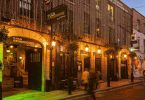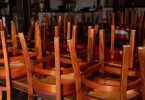Avoiding Law Suits – Practical Steps for Licensees & Theories of Liability
For example, it’s just as possible to trip and fall in a restaurant parking lot as it is to fall in a grocery shop parking lot. It’s not your responsibility as an operator of a licensed premises to ensure that accidents never happen in your facility; that would be impossible. It is your responsibility to operate in a manner that is as safe as possible and to react responsibly when an accident does occur. If you do not, the legal system is designed to hold you and your operation accountable.
Pubs – a world in microcosm
Licensed premises are truly a world in microcosm. The risk is daunting. Even with a full team of experts (manager, trained security staff and insurance broker) working full-time to prevent being sued, it’s a virtual certainty. This makes the operation of a licensed premise very challenging, sometimes overwhelmingly so.
Statistics from the Injuries Board indicate that the average award value for public liability cases was €23,143 in 2009 with slips, trips and falls causing most Public Liability accidents. Interestingly females account for seven out of every 10 PL awards, in direct contrast to data for workplace accidents where females account for just over a quarter of awards. One in five (19 per cent) PL awards relate to a licensed premises. Even during difficult economic times, or it could be argued especially in difficult economic times, investing in liability prevention can save money for operations that enjoy a significant public footfall on their property.
The Irish courts are often described as being "pro-plaintiff". This generalisation is not necessarily backed up by evidence. However it’s certainly true to say that a court will always be very conscious of a plaintiff’s interests.
The focus of this article however will be on issues relating to obligations under the licensing laws. In my capacity as trainer for the Responsible Service of Alcohol Workshop, it’s a recurring theme that alcohol and the challenges of serving it responsibly – which the vast majority of operators do – is at the root cause of many claims.
The two main areas of concern would be obligations under ‘duty of care’ with regard to public liability issues and secondly issues regarding obligations to run an orderly house and in particular – acts by doorstaff, defamation of character and Equal Status issues.
Intoxicating Liquor Act 2008 – The Licensee’s Obligation To Refuse Service To Drunk Customers And The Implications Arising From This DutyAm I obliged to serve a drunk customer?
No – and it is a criminal offence to do so under the Intoxicating Liquor Act 2008.
What exactly is a "drunk customer"
The Act creates a definition of "drunken person". This is a person who is drunk to such an extent that it would be reasonable to think that they could endanger themselves or others.
So, if you have a reasonable belief that a person is so drunk that they will hurt themselves, or another person (be it another customer, a member of staff or anyone else), not only do you have the right to refuse to serve them, you must refuse to serve them.
Could somebody sue for defamation where a licensee tells a customer that they will not be served (or admitted) because they are drunk?
In certain circumstances yes. This would be in a situation where any of the provisions of the Intoxicating Liquor Act 2008 are applied by a licensee (ie where a licensee refuses to serve someone who is drunk or to admit them into the bar etc). In other words, it is possible that a person could be defamed if a publican refuses to serve them a drink or refuses to let them into their premises or asks them to leave their premises.
Defamation is generally defined as "… lowering a person in the eyes of right-minded members of society…".
Under the Act, publicans can only refuse to serve customers who they believe to be drunk. Therefore, if service is refused under the Act, you automatically create a presumption that the person is drunk. If they are not – as a matter of fact – drunk, then they may seek to argue that they have been defamed and sue you.
Likewise, if admittance to a pub were refused (because a doorman tells a customer they are drunk and cannot come in), this would be defamatory if that person could later prove that they were not drunk.
One of the most important things that should be done by the manager responsible for refusing service or refusing admittance, telling a customer to leave because they are drunk, is to write down exactly what happened immediately after the incident.He or she should record the time, the date and the nature of the incident and should include the customer’s name (if this information is available) and should, in particular, reflect the fact (if it is the case) that the refusal was carried out beyond the earshot of other customers. The manager should also record the reason he or she refused service and the behaviour that led to the belief that the person was drunk. If other staff members witnessed the incident, their statement or statements should be appended to the manager’s report.
Occupiers’ Liability
Customers are people on your premises at your invitation, or with your permission. The overwhelming majority of persons present in a pub or other licensed premises fall into this category. The duty owed by the occupier is that you must take ‘reasonable care’ to prevent injury.
What does the law consider to be "reasonable care"?
This of course varies from case to case. However, it will obviously be unreasonable for a publican to ignore, for example the fact that floor-tiling was cracked and that somebody could easily trip over it. Likewise, if a toilet floor becomes flooded with water and the publican takes no steps to mop it up, this will not constitute "reasonable care".
However, if a publican could not have been reasonably aware that the floor had become flooded (for example where the flooding and the accident occurred in rapid succession), they would probably not be found guilty of negligence. This would, of course, be the case where the publican could not have expected the flooding in the first place. If a pipe was defective, a Court would probably find that there was risk that water would leak out of it and that somebody could slip on the water and injure themselves.
What practical steps can you take to limit liability?
Conduct Liability Audits – and retain documentation. Limiting or preventing claims relating to the premises can be accomplished by conducting a legal liability audit; lighting dimly-lit areas and eliminating labyrinthine corridors or stairways will help prevent slip-and-fall cases and decrease liability due to inadequate security. Frequently upgrading something as basic as lighting will significantly limit claims.
Speak to Witnesses and obtain witness statements
• It can be crucial to obtain witness statements as soon as possible after the incident. The value of contemporaneous notes is greatly enhanced evidentially if they are taken in a certain way. For them to be admissible in evidence in criminal proceedings they would have to conform to Rules of Evidence and statutory codes of practice.
• Notebooks should be regarded as an official document. The notes recorded in them should be:-
• Factual – write nothing you would be unhappy to read out in court
• Made in ink at the time of an event or as soon after as is reasonable and practical
• Dated — Amendements to be initialled, no overwriting, same pen
• Original and not copied from elsewhere – retain notebooks.
Are there any examples of cases?
A woman who sued a County Mayo pub had claimed that the pub owner was negligent for allowing a bathroom floor to become soaked with water. An independent witness(who was using an adjoining cubicle at the time) was able to give evidence that she had heard two women talking and that one of them had whispered to the other "just lie The pub owners had approached her shortly after the incident and she had written down an account of her experience.
In another case, a 37 year-old housewife was found to have blatantly manufactured a £30,000 damages claim against a public house in which she’d fallen off a bar stool. A crucial part of the evidence for the defence wasthat the pub owner could give evidence of a clear recollection of the plaintiff having fallen and then getting up and continuing to drink. In another case a plaintiff was awarded damages against Sachs Hotel in Dublin following a fall.
She had been descending steps to the nightclub entrance when she caught her left foot in a broken tile and was then thrown forward and ended-up falling down the steps. The trial judge stated that the hotel should have recognised that the broken tile was a potential source of danger to persons frequenting its nightclub – a danger which, it seems to me, it took no steps to avoid. She was awarded IR£51,500.00.
Recently, in the High Court, Mr Justice Kevin Feeney ruled that a publican did not owe a duty of care to an elderly man whom they had served six pints of Guinness to before he drove away and died in a road accident in which a woman was also killed. He rejected arguments that the publican breached the law by supplying alcohol to a drunken person. It was not established that the man who died was a ‘drunken person’ under the Intoxicating Liquor Act 2003 and there was no legal basis for restraining him.
Evidence was presented that the deceased was a regular and that on some occasions he did not drive home after drinking. It was deemed that such an argument was impractical and would place ‘an impossible burden’ on publicans. The judgement was significant as there would have been implications for the entire licensed trade.
Am I liable for violent acts committed by my door supervisors?
Yes; in April of 2011 a man in County Meath was awarded €100,000 in settlement of a High Court case against the Ardboyne Hotel for alleged assault by doormen. The man claimed that a pre-existing epilepsy condition ‘significantly worsened’ since he was allegedly assaulted by two doormen.
In another case, after attending Marleys Night Club (Taylors Grange Hotel in South Dublin), the plaintiff ended up losing an eye. He was known in the premises and he had previously been barred.
At closing time he went to leave the nightclub and skipped the queue for coats. There was an altercation with another patron.
The plaintiff was pushed out the doors by door supervisors into the car park.
There were about 25 other people in the car park and some kicking of the door and some throwing of bottles and other objects at the building took place. A mini-riot ensued outside.
In the middle of this, a number of door supervisors emerged with baseball bats. One of them struck the plaintiff blinding him permanently in the right eye.
The Judge accepted that the owners/occupiers of a premises are entitled to employ trained staff in order to ensure business is conducted in a proper fashion and that the safety of customers as well as workers and the premises themselves are safeguarded against violent conduct.
But he said that they could only ever employ reasonable force.
Also, he said he believed it was just and reasonable that the defendants had a duty of care to the plaintiff.
He ruled that the appropriate course of action was to contact the Gardai and to wait for them to arrive in order to deal with the situation.
The Judge placed emphasis on the fact that this was not a disturbance within the premises themselves, it was a disturbance outside.
He did not believe it was appropriate for the management "…to send out their own troops, so to speak…" in order to break-up the disturbance. That action led to direct confrontation between the troublemakers outside and the security staff and he felt it was inevitable that somebody would be injured.
He awarded damages of €100,000 but found that the plaintiff had contributed to the incident so halved this amount by 50 per cent.
In one High Court case in 2002 a plaintiff was awarded €76,402. He had been
drinking in the Killeen House pub in Co Cork and suffered serious injuries after he was attacked by other customers. He claimed that the pub owners were negligent in failing to take care for his safety when they knew or ought to have known that some patrons were behaving in an aggressive, violent and unruly manner. He alleged that the pub owners failed to employ sufficient staff to monitor patrons.
So, what is Reasonable Care?
There is no formal standard definition but it is likely that a publican who could prove that he or she was reasonably vigilant would not be penalised.
For example, if a violent situation develops very quickly and there were no indications in advance of the incident (such as provocative actions, shouting, shoving etc), a publican will probably be able to defend a case. Could it reasonably have been foreseen?
Practical Suggestions to Consider:
· Develop House Rules that are appropriate to your establishment; display and promote these – the process of developing the House Rules is as important as the rules themselves. Suggested as an introductory note would be For the safety and security of our patrons and employees and in accordance with our legal obligations and rights, the following House Rules apply. This licensed premises supports the principles of equality and the House Rules will be exercised in a non-discriminatory manner.
· Liase with your insurance company over House Rules, structure of incident reports, timelines for reporting of incidents (it could be deemed that late notification of an incident could predujice the defending of the case and the insurance cover may not apply) and indemnity from security providers.
· Invest in having written ‘Method Statements’ ie for mopping floors, transport of glasses around the premises, dealing with broken glass situations, intervention policy for someone in violation of each house rule etc.
· Be careful in dealing with incidents where a well-meaning customer service gesture could be deemed as an admission of liability. Read and react – don’t bring a claim on, balance with doing everything as if you will have to defend your action in court – this comes with experience so have your most senior people involved in dealing with incidents, only have staff deal with situations to their level of accountability.
· Make sure your security service providers have valid insurance with the particulars in writing as to indemnity and a ‘Code of Conduct’ in place with them as to what is appropriate for your circumstances.
· Invest in technology, if you think you have enough CCTV you probably don’t; is it all focused and in the right locations? Some larger nightclubs are investing in‘headcams’ and dedicated control room communications staff to assist in early prevention and retrieval of CCTV footage. Keep CCTV footage safe; make two copies – one for you and one for insurers or Gardai.
· Consider enrolling staff and management in the Responsible Service of Alcohol Workshop and Drug Awareness on Your Licensed Premises. These courses are also requirements for ‘Nightsafe’, the Irish Nightclub Industry Association initative.
· Be disciplined in taking contempraneous notes and having relevant and detailed incident reports. File and archive carefully. The Civil Liability and Courts Act 2004 reduced the time-limit for taking a personal injuries claim to two years.
· Internal liability audits are important to conduct – a monthly tour of the premises, documented with corrective action.
· Review your Health & Safety Statement with a risk analysis through an industry professional and involve staff in this; consider a ‘Near Miss’ competition incentive for staff to spot risks early and take preventative action.
· Keep Records, Document, Document, Document!
Reports should be compiled immediately. With time, memories fade and if you end up in court, you will suffer if your bar manager’s evidence is unclear. Having a written record will allow your manager to refresh his memory as to what happened. The sooner after the incident that the report is written, the more detail will be remembered and the better and more accurate the evidence will be.
Finally, it is impossible to foresee the future, so every single incident should be treated with equal seriousness: every single case should be dealt with as if you expect to end up in court.
· Your staff should be made very familiar with the Equal Status Act and should be fully aware of what they may – and may not – do. Reference to this should be made in your House Rules and Employee Handbook.
Monitor your premises
This is a very obvious point and probably one that the majority of publicans are acutely aware of. In our litigation-conscious society, it is impossible to open a newspaper without reading about somebody being sued.
However, it merits repeating. The more spot-checks or internal audits you carry out, the more likely you are to discover a hidden risk. And, of course, the less likely it is that your premises will be at risk of causing somebody to slip, trip or otherwise injure themselves.
Invest in training – RSA workshops, Occupational First Aid and customer service training – after all, a person who has fallen, been assaulted etc is a dissatisfied customer and early intervention by actively listening, identifing the key points, empathising and taking appropriate action, can prevent many situations from developing into a claim situation.
Employees and customers are subject to many of the same risks in a hospitality facility that they are subject to outside the facility.








